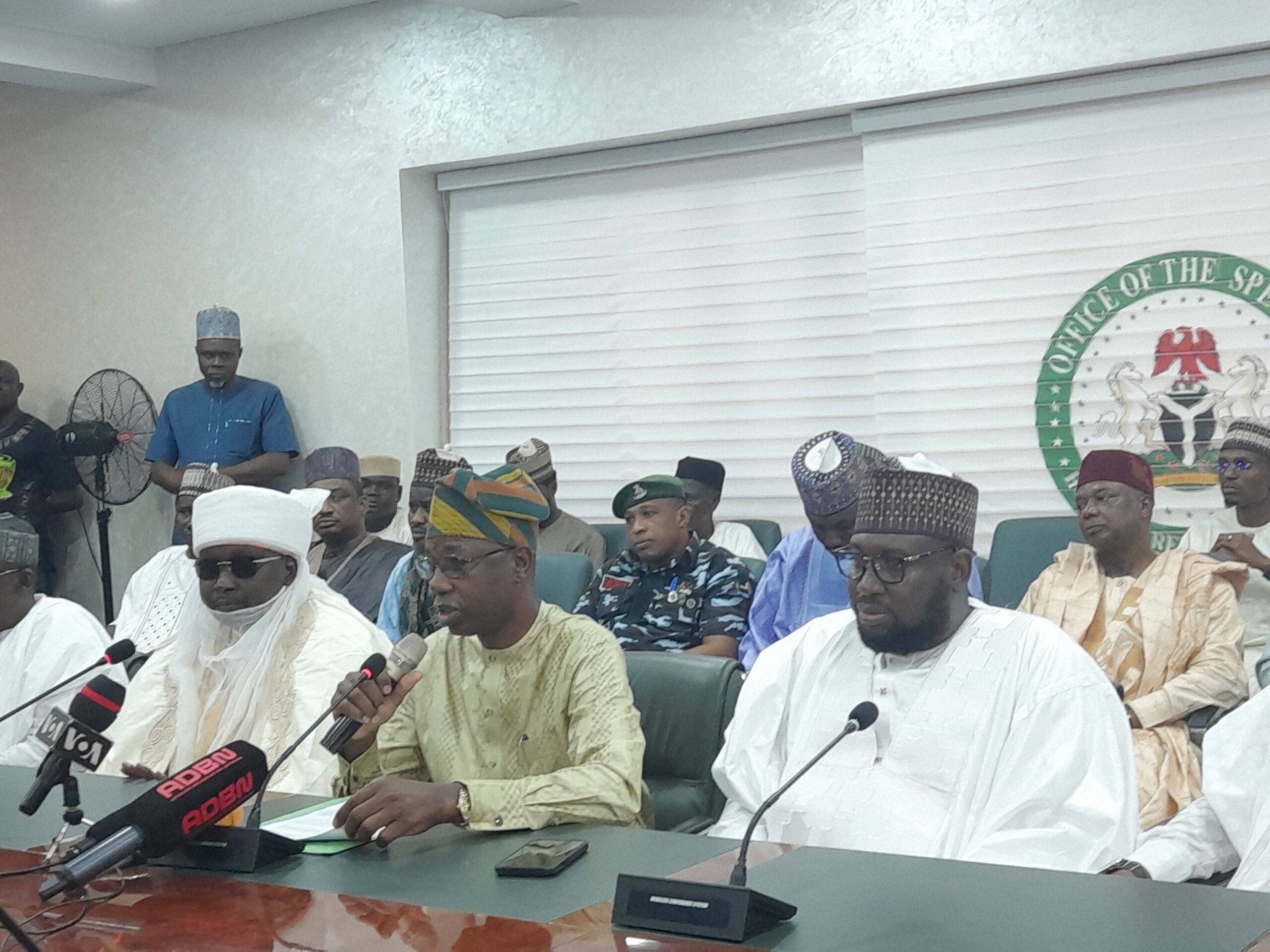News
Akpabio, Lawan, Ndume Throw Nigerian Senate Into Rowdy Session Over N23Trillion Ways & Means Funds Approved By 9th Assembly

The Nigerian Senate was thrown into a rowdy session on Wednesday by the Senate President, Senator Godswill Akpabio, immediate past Senate President, Senator Ahmed Lawan and Senate Chief Whip, Senator Ali Ndume.
There was a mild drama in the Red Chamber as the Senate leaders disagreed over the N23 trillion Ways & Means funds approved by the 9th Assembly under the leadership of former Senate President, Lawan.
Addressing the Senate on the report of the Senate Committee set up to probe the Ways & Means funds approved by the 9th Assembly for former President Muhammadu Buhari’s administration, Akpabio said what the Senate did under the leadership of Lawan had thrown Nigeria into a more economic mess.
Directly asking Lawan to speak on the issue, Akpabio said, “We are saying what you did at that time has put the nation in more mess economically. Therefore, because of the current economic situation we have found ourselves, there is the need for us to look at the details to know whether they were rightly spent.”
Lawan said there is nothing that the National Assembly that makes laws cannot look into and review.
He said that if there were expenditures wrongly done in contradiction to the provision of the constitution, the National Assembly could look at the expenditures and if sanctions were needed for unlawful actions or unauthorised expenditures, the National Assembly would provide the sanctions.
The former Senate President argued: “What the 9th National Assembly approved or rectified in terms of Ways & Means was not N29 trillion or N30 trillion, it was N22 trillion. But there was N819 billion to attend to, deal with and address very serious infrastructure dilapidations that we had across the country.
“If we have a Ways & Means that is N30 trillion today, that means something happened between then and now, and it is for the National Assembly to find out what happened.”
Lawan insisted that nobody in the chamber should suggest that the Assembly should not look into what they feel is in the public interest, “but what Nigerians want today is food and security”.
“This (Ways & Means issue) belongs to the medium or long-term action that we need to take. How are we going to provide food for Nigerians and protect their lives?
“Let us not put the cart before the horse. Let’s consider it necessary to look at what happened in the past, but we in the present and the present is so unpleasant and we have to act very swiftly,” he said.
Responding to Lawan’s submission, Akpabio said, “Even though the Ways & Means were part of the things that put us where we are today, we are saying that expenses that were not explained, that we don’t have details about put us in the indebtedness that we are seeing today.”
Akpabio noted that it has affected the ability of the government to provide essential needs and services to Nigerians and that the National Assembly needs to look into it.
He however agreed that Nigerians are currently faced with a food crisis and they need to act immediately to put food on the table of Nigerians.
Akpabio said, “What we got to N30 trillion was because of the interest element. They brought that before this current Senate, that the interest has accrued to the N23 trillion that was passed by the 9th Senate and that they needed additional N7 trillion which was the interest. We passed the interest and that is what was added to make it N30 trillion.”
Speaking further, Akpabio confronted the Senate Chief Whip, Ndume, that he was part of the 9th Senate that approved the Ways & Means, but Ndume quickly denied being involved in its approval.
Ndume said, “I was not there; check the record. You cannot approve illegality. What they did was illegal. The Senate doesn’t have the right, let it be on record.”
Ndume’s denial of being part of lawmakers who approved the Ways & Means in the 9th Senate threw the session into rowdiness as some of the lawmakers insisted that Ndume was involved.
Ndume argued that the Senate only has the right of approval but doesn’t have the right to rectify when money has been spent.
“We don’t have the right to rectify, we only have the right to approve,” he said.
He further said that the 9th Senate only approved N819 billion and that the details of other funds that had been spent should be provided.
He said, “It has never been provided till date. This committee should find out what happened to the money. People must be held responsible and they should come and explain to this Senate what they did with the money. Now is the time that people are looking for their money everywhere, where is that money?”
Akpabio sarcastically said, “I want you to know that Senator Ndume cannot remember being there when the thing happened.”
The Senate President said that what the Senators from the 9th Senate were saying was that the total amount of N30 trillion was brought before them for approval, however, they left a caveat that they could approve the funds but they needed details and that till date, the details had not been provided.
On his part, Senator Mustapha Habib representing Jigawa South West Senatorial District said that in addition to the Ways & Means, there were loans given to state governments and the manufacturing sector, some of which had not been returned.
“We have a colossal amount of money given to the banks and this amount ran into trillions of Naira. We need to really interrogate this. DisCos (Electricity dictribution companies) were also given money by the CBN (Central Bank of Nigeria). This money needs to be returned to CBN,” he said.
News
Finally, IGP approves hunger protests across Nigeria

The Nigerian police has finally approved the planned nationwide protests and outlined conditions for participants.
The Inspector General of Police, Kayode Egbetokun, revealed this on Friday while addressing journalists in Abuja.
He urged all groups planning to participate in the proposed nationwide protest to submit their details to the Commissioners of Police in their respective states.
The police boss said this was to ensure the protest was peaceful.
Egbetokun said, “We acknowledge the constitutional right of Nigerian citizens to peaceful assembly and protest.
“However, in the interest of public safety and order, we urge all groups planning to protest to provide necessary details to the Commissioner of Police in the state where the protest is intended to take place.
“To facilitate a successful and incident-free protest, they should please provide the following information: state the proposed protest routes and assembly points; expected duration of the protest; and names and contact details of protest leaders and organisers.”
The police boss said the information expected from the organisers also include measures to prevent hijacking by criminal elements, as well as key identifiers for possible isolation of potential troublemakers.
By providing the information, he said, the police will be able to deploy adequate personnel and resources to ensure public safety.
He said the police needed to know the specific routes and areas for the protest to avoid conflicts with other events or activities.
Mr Egbetokun said the police will “establish clear communication channels with protest leaders to address any concerns or issues that may arise; minimise the risk of violence, property damage, or other criminal activity.
“We encourage all protesters to cooperate with the police, obey the law, and adhere to global best practices for peaceful assembly to guarantee a safe and successful exercise of their rights.
News
Reps North-West Caucus Beg Youths, Citizens In The Region Not To Join Planned Protest

News
Reps Applaud FCT Minister, Wike On AICL Improved Revenue, Infrastructure

-

 News23 hours ago
News23 hours agoIwuanyanwu was a Heavyweight in all ramifications-Abaribe
-

 News22 hours ago
News22 hours agoTinubu, Southern Govs Mourn Iwuanyanwu
-

 News22 hours ago
News22 hours agoSokoto Governor, Aliyu’s Wife Holds Lavish Birthday As Guests Spray Dollar Notes On Her Amid Hunger, Hardship
-

 News22 hours ago
News22 hours agoProtest: President Tinubu In Closed-door Meeting With Traditional Rulers (Video)
-

 News24 hours ago
News24 hours agoTinubu’s Presidency Is Failing Nigerians – Afenifere
-

 News19 hours ago
News19 hours agoNationwide protest: ‘Airport Is Filled Up, Govs, Senators, Reps, Ministers Traveling Abroad’ — Fayose
-

 News23 hours ago
News23 hours agoIGP Orders DPOs, Their Men To Storm Vulcanizer Shops Ahead Of Planned Nationwide Protest
-

 News23 hours ago
News23 hours agoI Participated In Peaceful Protests For Democracy – Tinubu







